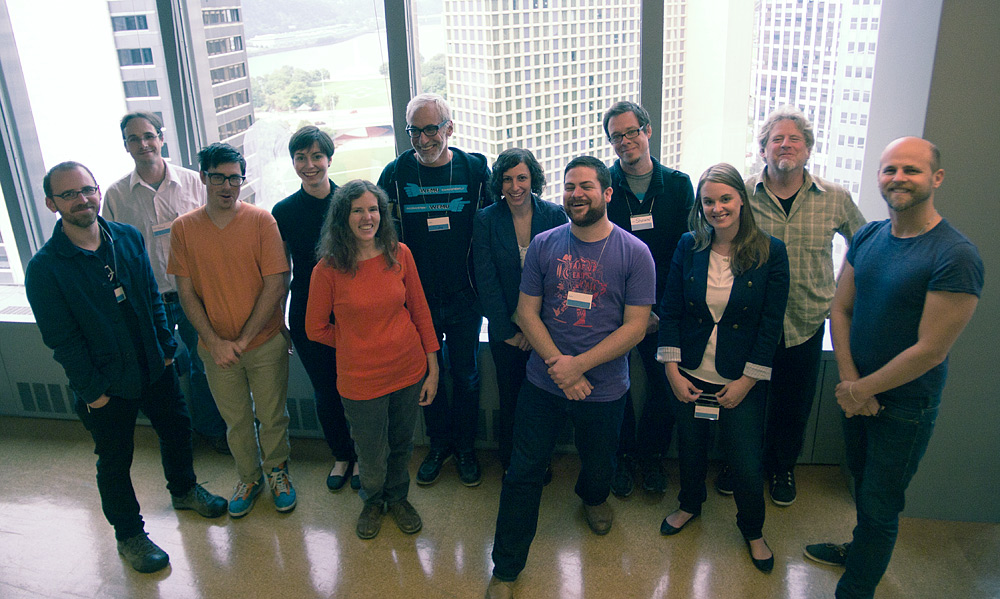
Innovation starts with people
“Our object is not to know the answers before we do the work. It’s to know them after we do it.”
Every day my colleagues and I have the unique privilege of working with people developing new technology and approaches for media and information. Through our Prototype Fund and other programs we focus not only on finding good ideas but also on identifying curious people who are invested in understanding the needs of their audience or community.
Last month, we hosted a two-and-a-half day human-centered design and planning workshop for new Prototype Fund grantees. This event, at the Pittsburgh-based LUMA Institute, was designed to give participants hands-on experience of design methods that put people at the center of innovation.
The feedback I’ve received already indicates that the workshop may have a lasting impact on the grantees. “We’re already making unexpected discoveries; this rapid prototyping really works,” one participant wrote in an email. Another said, “I learned quite a bit, including some principles for use in the rest of my career.”
Those are the types of experiences we sought to create. From fly-on-the-wall observation to paper prototyping, the techniques gained through the workshop give grantees flexible, low-friction ways of interacting with and understanding the perspective of stakeholders connected to their individual projects. Ideation and storytelling techniques aid the development and presentation of new ideas. When done right, the methods can lead us to the spot where the design consultancy IDEO says innovation happens: the intersection of desirability, feasibility and viability.
Why human-centered design?
Quite often, when we are deep within our specializations, it is easy to forget that products, services, and programs need to connect with people who understand the world differently than we do. Bill Lucas, director of curriculum at LUMA, refers to this tendency to design solutions to problems based on our own perspective as self-centered design. He adds, “Investing in [human-centered design] is a deliberate act of fighting that tendency. It’s a way of being extra attentive and super intentional about designing in the service of others.”
HCD + journalism
At the core of human-centered design practices are skills that complement journalism. Observation, investigation and objectivity are key to building the empathy needed to develop key insights that lead to innovation. Even one of the most basic journalistic tools, the interview, holds an important place within a well-stocked human-centered design toolkit. As journalism faces reinvention, repurposing these skills—and picking up a few new ones—is essential to connecting with new audiences and building new products and models.
Let’s prototype!
The Knight Prototype Fund helps individuals and teams explore early-stage ideas. Grantees are awarded $35,000 to research and build solutions to media and information needs. Each quarterly group starts with the human-centered design training described above and ends with a demo day where grantees share their learnings and prototypes.
Here’s what some of our grantees will be working on following the recent workshop:
- Access: HowSecureAmI.org, a digital security risk assessment tool that will provide journalists with security advice.
- Curious City: an online system for community-driven story creation, as open source software and methods replicable at other radio and news organizations.
- Data Docs: a javascript library to add live data and visualizations to web video.
- DocHive: a tool to extract structured data from image-based PDF files.
- Get Outside – A Toolkit for Sharing Parks Data and Maps: software and templates to make it easier for parks departments to map their services and events.
- OnBoard: a website that will provide pathways to diversify participation on local boards, committees and commissions by opening up data about membership.
- Transom: online workshops to teach radio and multimedia storytelling.

Would you like to join this group and work on a prototype as well? If you’re interested in applying, the next deadline is Oct. 25. For more information, contact me via e-mail or on Twitter, @heychrisbarr.
Chris Barr, media innovation associate at Knight Foundation
Recent Content
-
Journalismarticle ·
-
Journalismarticle ·
-
Journalismarticle ·


